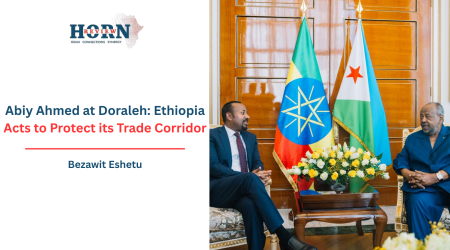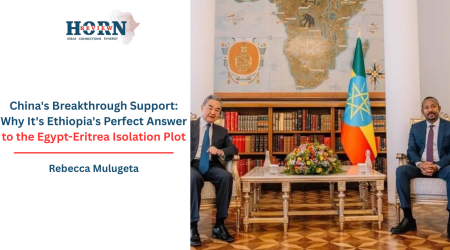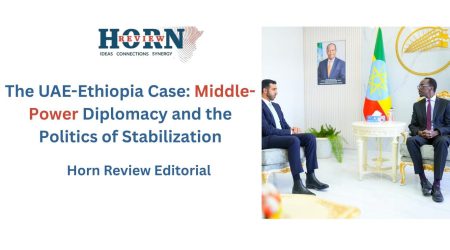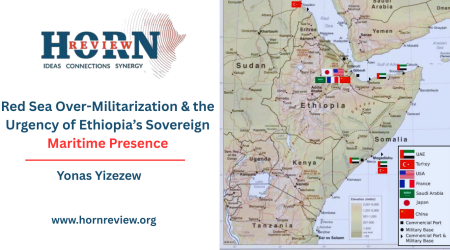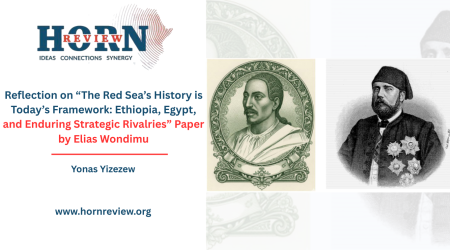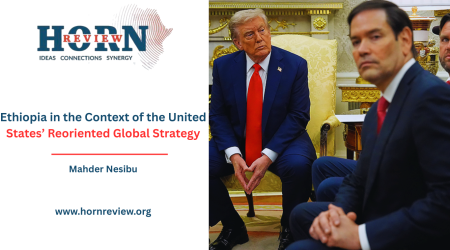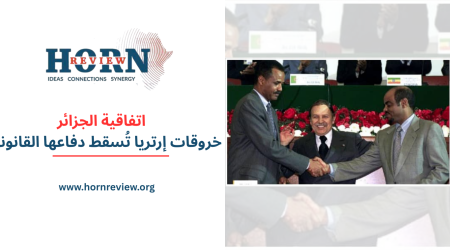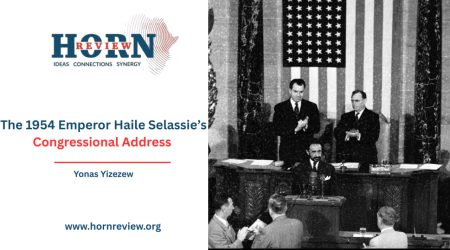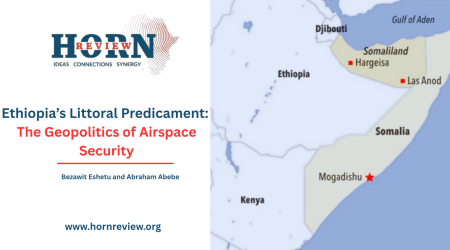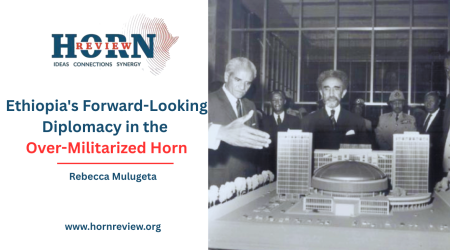
31
May
Religion, Realignment, and the Red Sea: Ethiopia Navigates a Changing Middle East
The geopolitical chessboard of the Middle East and North Africa region is witnessing a profound realignment, where the old rules of engagement, often dictated by religious or ideological solidarity, are increasingly being supplanted by the pragmatic pursuit of national interests.
A very powerful illustration that symbolized this new reality was the public display of an Israeli flag at the ‘African Lion 2025′ military exercise in Morocco. This action symbolized, in an effective manner, the normalization of the relationship between an Arab Muslim country and Israel—a relationship cemented by tangible strategic benefits, mainly the acknowledgment of the United States’ support for the sovereignty of Morocco over the territory of Western Sahara in exchange for Morocco’s agreement and commitment to establish full diplomatic relation with Israel.
The December 2020 rapprochement has since grown into a booming trade relationship, reportedly rising to a doubled $116.7 million in 2023, accompanied by close security cooperation. This cooperation features large arms sales by Israel to Morocco and negotiations on a trilateral American-Moroccan-Israeli investment fund. The conspicuous display of the Israeli military in Morocco, even in the face of expected public outrage, underscores a governmental calculus in which perceived strategic benefits of economic, technological, and security-related gains are given precedence over conventional allegiances and internal sensitivities.
This transition has a broader reach than Morocco. Israel has been working assiduously to build better ties with the wider Arab world, primarily driven by a confluence of shared interests. The Abraham Accords brokered in 2020 normalized relations between Israel, the United Arab Emirates (UAE), and Bahrain, with Sudan also initiating a similar process. The Accords were based on the allure of Israeli technological excellence in the spheres of cybersecurity, Agri-tech, water management, and renewable energy, all key to the ambitious economic diversification plans of the Gulf states.
The United Arab Emirates, for example, signed a Comprehensive Economic Partnership Agreement with Israel in 2022 with the goal of reaching bilateral trade of $10 billion per year by 2027. Beyond bilateral trade and investment, multilateral initiatives like the I2U2 group (India, Israel, UAE, U.S.) are emerging, focusing on joint ventures in critical sectors. A key driving factor for these new alignments is a shared security concern, particularly regarding Iran’s regional influence and nuclear aspirations. This has led to increased security cooperation, including intelligence sharing and Israeli arms sales to countries like Bahrain and Morocco, as well as Israel’s integration into the United States Central Command area of responsibility, thus enabling better military coordination with Arab partners.
Even long-standing peace agreements, like those with Egypt and Jordan, while often described as a “cold peace” due to limited public enthusiasm, are fundamentally rooted in strategic calculations of border stability, resource management (like water sharing with Jordan), and security coordination. The fate of the Palestinians remains an intensely emotional and political issue across the Arab world, often moderating the enthusiasm for these new relations at a societal level; however, the strategic and economic imperatives driving state-to-state cooperation have largely proven resilient.
Egypt’s Traditional Leverage – Religion as Foreign Policy Instrument
Egypt, long adept at harnessing pan-Arab and Islamic sentiment, continues to wield religious solidarity as a tool of statecraft—particularly in its dealings with Ethiopia over the Grand Ethiopian Renaissance Dam (GERD). Cairo has systematically framed Ethiopia’s actions on the Nile as an existential threat to Arab water security, thus galvanizing support from the Arab League and securing resolutions aligned with Egyptian interests. This “Arabization” of the Nile discourse is part of a broader strategic effort to preserve Egypt’s historical hegemony over the river, often invoking colonial-era treaties that Ethiopia never recognized.
But Egypt’s maneuvering extends beyond water politics. In recent years, it has sought to deepen its presence in Somalia, a move interpreted by many as a bid to encircle Ethiopia diplomatically and exert pressure from multiple fronts. Through a careful invocation of religious and regional solidarity, Egypt aims to craft a diplomatic ecosystem that isolates Ethiopia and curtails its regional influence.
This presents Ethiopia with a multifaceted challenge. To effectively counterbalance Cairo’s narratives, Addis Ababa must adopt a nuanced and layered approach—one that simultaneously amplifies African unity, capitalizes on shared development goals with the Arab world, and asserts its rightful stake in regional policymaking.
One avenue lies in consolidating a pan-African consensus on transboundary water rights, mobilizing support among non-Arab African nations to resist the unilateral framing of the Nile as an exclusively Arab concern. At the same time, Ethiopia can deepen its ties with moderate Arab League members—most notably Morocco—whose economic and diplomatic posture is increasingly pragmatic. By cultivating parallel alliances within the League, Ethiopia can gradually dilute Egypt’s monopolization of the Nile narrative.
Moreover, the evolving geopolitics of the Red Sea offer Ethiopia another critical axis of engagement. By positioning itself as a reliable partner in safeguarding maritime stability, countering transnational threats, and facilitating trade routes, Ethiopia can claim a more prominent role in regional security dialogues—thus expanding its diplomatic bandwidth beyond Nile-centric disputes.
Legacy to Leverage – Ethiopia’s Strategic Path in an Era of Realignment.
Ethiopia stands uniquely poised to thrive in this emerging landscape of interest-driven diplomacy. Armed with historical legitimacy, a growing economy, and an increasingly dynamic foreign policy posture, it can chart a course that not only fortifies its regional influence but also fosters enduring partnerships across the Middle East.
The model emerging from the Israeli-Moroccan rapprochement—anchored in mutual benefit rather than ideological affinity—offers a compelling precedent. Ethiopia can emulate this pragmatic paradigm, deepening economic, technological, and defense ties with Arab states, particularly those like Morocco and the Gulf monarchies that are increasingly disenchanted with outdated diplomatic orthodoxies.
Saudi Arabia’s Vision 2030, which prioritizes food security, economic diversification, and technological innovation, aligns almost perfectly with Ethiopia’s agricultural potential and demographic dynamism. Ethiopia, endowed with arable land and a young, abundant labor force, is well-positioned to become a strategic supplier to the Kingdom’s food markets—provided it can unlock Gulf investments in agri-infrastructure, logistics, and irrigation.
Similarly, Ethiopia’s burgeoning relationship with the United Arab Emirates since 2018 has laid the groundwork for robust cooperation across energy, logistics, and infrastructure development. The strategic alignment between the two nations—particularly around Red Sea security and port connectivity—offers a powerful platform for consolidating mutual interests.
Yet, this path is not without obstacles. Ethiopia must overcome internal governance challenges, policy unpredictability, and residual political instability that could deter foreign investment. Furthermore, deeper engagement with Arab states—particularly those normalizing ties with Israel—must be carefully calibrated to avoid alienating pan-African constituencies or provoking backlash from domestic political actors with sensitivities to Middle East politics.
One of Ethiopia’s most underutilized assets in this context is its Islamic heritage. The story of the First Hijra—the Prophet Muhammad’s companions seeking refuge in ancient Abyssinia—affords Ethiopia a rare and enduring spiritual connection with the Islamic world. This narrative of refuge, compassion, and coexistence can serve as a potent form of soft power, allowing Ethiopia to transcend sectarian divides and assert its relevance in Middle Eastern diplomatic forums. Unlike Cairo’s instrumental use of religious solidarity, Ethiopia’s invocation of heritage can be framed around mutual respect, historical continuity, and moral leadership.
To capitalize on these opportunities, Ethiopia should adopt a structured strategy rooted in four key pillars:
1. Economic Diplomacy and Investment Facilitation
2. Export-Led Value Chain Development
3. Soft Power through Cultural and Educational Exchange
4. Multilateral Coalition Building
Through calibrated diplomacy, institutional reform, and bold vision, Ethiopia can assert itself not merely as a regional player, but as a strategic interlocutor between Africa and the Middle East. In doing so, it transcends historical divisions and crafts a 21st-century foreign policy that is simultaneously grounded in heritage and oriented toward opportunity.
By Horn Review Editorial

